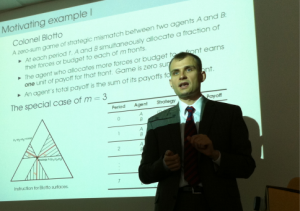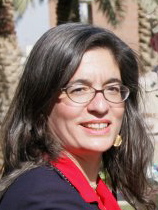Our team brings together expertise in anthropology, public policy, and computational social sciences, information technology, finance, and defense to bear on the study of global power and influence. Team members include the following individuals.
Janine R. We del, university professor in the School of Public Policy, is a pioneer in applying anthropological insights to topics dominated by political science and economics. The project draws on her expertise as an anthropologist studying power networks in eastern Europe and the United States and these books: Shadow Elite: How the World’s New Power Brokers Undermine Democracy, Government, and the Free Market; Confronting Corruption, Building Accountability: Lessons From the World of International Development Advising (with Lloyd J. Dumas and Greg Callman); and Collision and Collusion: The Strange Case of Western Aid to Eastern Europe. A public intellectual, Wedel has contributed congressional testimony and analysis pieces to more than a dozen major outlets, including the New York Times, Financial Times, Wall Street Journal Europe, Washington Post, Washington Times, National Interest, Nation, Politico, Salon, Los Angeles Times, Boston Globe, and Christian Science Monitor, and has been a featured columnist in The Huffington Post. Winner of the prestigious 2001 Grawemeyer Award for Ideas Improving World Order (previous winners include Mikhail Gorbachev and Samuel Huntington), Wedel is currently at work on a book exposing new forms of corruption in public policy tentatively set for 2014 to be published by Pegasus Books.
del, university professor in the School of Public Policy, is a pioneer in applying anthropological insights to topics dominated by political science and economics. The project draws on her expertise as an anthropologist studying power networks in eastern Europe and the United States and these books: Shadow Elite: How the World’s New Power Brokers Undermine Democracy, Government, and the Free Market; Confronting Corruption, Building Accountability: Lessons From the World of International Development Advising (with Lloyd J. Dumas and Greg Callman); and Collision and Collusion: The Strange Case of Western Aid to Eastern Europe. A public intellectual, Wedel has contributed congressional testimony and analysis pieces to more than a dozen major outlets, including the New York Times, Financial Times, Wall Street Journal Europe, Washington Post, Washington Times, National Interest, Nation, Politico, Salon, Los Angeles Times, Boston Globe, and Christian Science Monitor, and has been a featured columnist in The Huffington Post. Winner of the prestigious 2001 Grawemeyer Award for Ideas Improving World Order (previous winners include Mikhail Gorbachev and Samuel Huntington), Wedel is currently at work on a book exposing new forms of corruption in public policy tentatively set for 2014 to be published by Pegasus Books.
 Maciej Latek, a researcher in the Krasnow Institute for Advanced Studies at George Mason University is a modeler with expertise in economics, politics, security, statistics, operations research and data mining. He specializes in building analytical tools, decision support systems, and multi-agent simulations. He is also adept at database construction and graphics. Latek holds a Ph.D. in Computational Social Science from George MasonUniversity and a M.Sc. in Quantitative Methods from the Warsaw School of Economics. His doctoral dissertation was entitled ”On Bounded Rationality in Multi-Agent Environments.” He describes multi-agent simulation as “the core of the analytical and decision support tools I build to help decision makers to gain insight into the problems they face; to design policies, plans, procedures and programs and to evaluate their effectiveness.”
Maciej Latek, a researcher in the Krasnow Institute for Advanced Studies at George Mason University is a modeler with expertise in economics, politics, security, statistics, operations research and data mining. He specializes in building analytical tools, decision support systems, and multi-agent simulations. He is also adept at database construction and graphics. Latek holds a Ph.D. in Computational Social Science from George MasonUniversity and a M.Sc. in Quantitative Methods from the Warsaw School of Economics. His doctoral dissertation was entitled ”On Bounded Rationality in Multi-Agent Environments.” He describes multi-agent simulation as “the core of the analytical and decision support tools I build to help decision makers to gain insight into the problems they face; to design policies, plans, procedures and programs and to evaluate their effectiveness.”
Anne L. Washington, professor in the School of Public Policy at George Mason University, is an expert in finance and open government. After working for software development firms including the Claris Software division of Apple Computers, she worked for Barclays Global Investors, as well as for Wells Fargo Nikko Investment Advisors in multiple technology
and corporate training positions. Before completing her PhD, she was with the Congressional Research Service at the Library of Congress. She holds a Bachelors of Arts in computer science from Brown University and a Masters in Library Information Science (MLIS) from Rutgers University. She received a PhD in Information Systems and Technology Management from The
George Washington University School of Business. Her current research projects investigate government transparency, parliamentary technology, data innovation and the financial crisis.
Julia L. E. Pfaff, an adjunct professor at George Mason University, is an expert on the military and skilled project manager. She holds an M.A. degree from the School of Public Policy. Pfaff is an Army veteran with over 20-years of management experience in the government and nonprofit sectors. As the first executive director of the National Military Family Association (NMFA), she led the transition of the 35-year-old organization from a volunteer managed organization to a professionally managed one with an active board leadership and a four-star rating from Charity Navigator for financial efficiency and organizational capacity. She served on the business faculty of the Australian College of Kuwait, where she developed and taught a wide range of business related subjects.
Matthew Dic kert is a Policy Fellow for the George Mason University Shadow Influence Project. A graduate of Beloit College and George Mason University, School of Public Policy, Dickert serves as a research specialist helping to oversee financial analysis and economic forensics. He provides insights on current industry research foci involving capital flows, information asymmetries, financial innovations, and incentive structures. Dickert provides guidance on the reporting of public sector pension plan assets and on the scope of fiduciary responsibilities fundamental in a public-private retirement plan system. Dickert has a background in facilitating economic modeling exercises for multiple institutional stakeholders and providing guidance on delivering financial instruction to diverse constituencies. He has a diverse set of research skills, acquired while tracking Mutual Fund market trends at the Investment Company Institute, and expertise liaising with public regulatory authorities and private sector actors on the dynamics and implications of market events.
kert is a Policy Fellow for the George Mason University Shadow Influence Project. A graduate of Beloit College and George Mason University, School of Public Policy, Dickert serves as a research specialist helping to oversee financial analysis and economic forensics. He provides insights on current industry research foci involving capital flows, information asymmetries, financial innovations, and incentive structures. Dickert provides guidance on the reporting of public sector pension plan assets and on the scope of fiduciary responsibilities fundamental in a public-private retirement plan system. Dickert has a background in facilitating economic modeling exercises for multiple institutional stakeholders and providing guidance on delivering financial instruction to diverse constituencies. He has a diverse set of research skills, acquired while tracking Mutual Fund market trends at the Investment Company Institute, and expertise liaising with public regulatory authorities and private sector actors on the dynamics and implications of market events.


